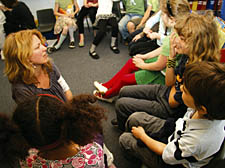|
|
 |
| |

Miriam Cohen Christofidis introduces Eleanor Palmer pupils to philosophy |
Philosophy pupils in at deep end
Primary school youngsters get to grips with the big ideas during education trials
INTELLECTUAL debate stopped momentarily at Eleanor Palmer Primary School last week when one philosopher, aged eight, demonstrated the nature of experience by making a fellow thinker hit his own face repeatedly.
Aristotle might have turned in his grave, but occasional lapses are to be expected on philosophy’s voyage through the uncharted waters of primary education.
In recent months, children as young as five from two Camden schools – Eleanor Palmer in Tufnell Park and Fleet School in Gospel Oak – have been pondering life’s deeper meaning in a series of hour-long classes run by social enterprise The Philosophy Shop.
If the trials of the academic discipline prove successful, classes could soon be rolled out in primary schools across the country.
But do young minds have the time or the capacity to grapple with such weighty concepts?
Critics, such as the Campaign for Real Education, have claimed teachers and children should concentrate on the curriculum.
Kate Frood, headteacher at Eleanor Palmer, dismissed the argument against as “Gradgrind”.
“I suppose philosophy challenges some people’s views of what schools are about, but we are not just here to fill empty vessels, we are here to light minds,” she said. “You learn by asking questions and making mistakes.”
The school employs a former UCL tutor, Miriam Cohen Christofidis, to run the lessons.
Instead of slogging through Plato’s Republic, children play word games as a warm-up to the main event – the philosophical question of the day.
When the New Journal sat in on a Year 4 class last Thursday, the discussion revolved around the pros and cons of spending life plugged into a machine that could simulate any experience.
Hands went to chins and legs crossed automatically as the group of 30 children pondered whether they would or wouldn’t be plugged in.
Ms Christofidis added that in the machine “you can even climb the chocolate mountain”. A little boy shouted “Hooray!”
“I wouldn’t because say if your favourite food was fish and chips and your mum bought it for you every day then it wouldn’t be special any more,” said a girl with a ponytail.
“Let’s say you shot someone. You wouldn’t suffer any of the consequences,” offered the boy who had been making his colleague punch himself.
The Experience Machine question was originally posited by the Harvard philosopher Robert Nozick as a refutation of utilitarianism, the moral theory that what matters is the happiness of as many people as possible.
The children do not know this, but Ms Christofidis believes they can still benefit from the ideas behind graduate-level philosophy.
“They will not always come out with a fully clear understanding, but it sows a seed,” she said.
The greatest problem for this initiative, according to Ms Christofidis, is the moral code enforced by some teachers at primary school level.
“There are some teachers who worry where the discussion might go if you let a child have certain thoughts. It’s quite a challenge to manage the teachers in the room sometimes,” she said.
After the class, Ms Christofidis added: “It’s not going to reach to every child. But they need to ask ‘Why?’ It’s really important to think that you’ve actually got something to say.” |
 |
|
|
 |
| |
| |
|
 |
|